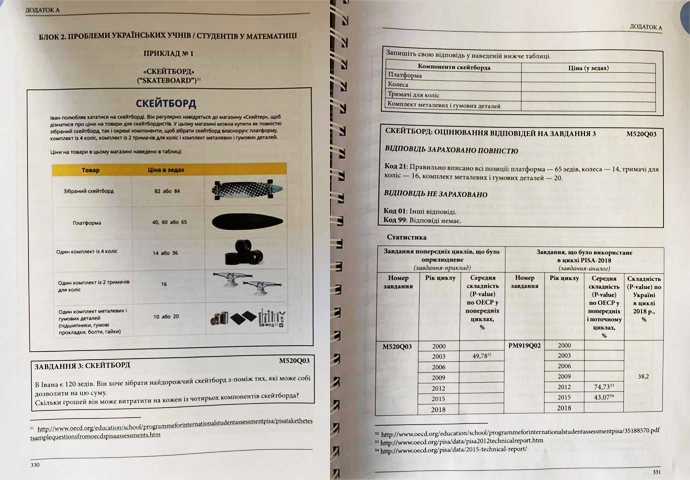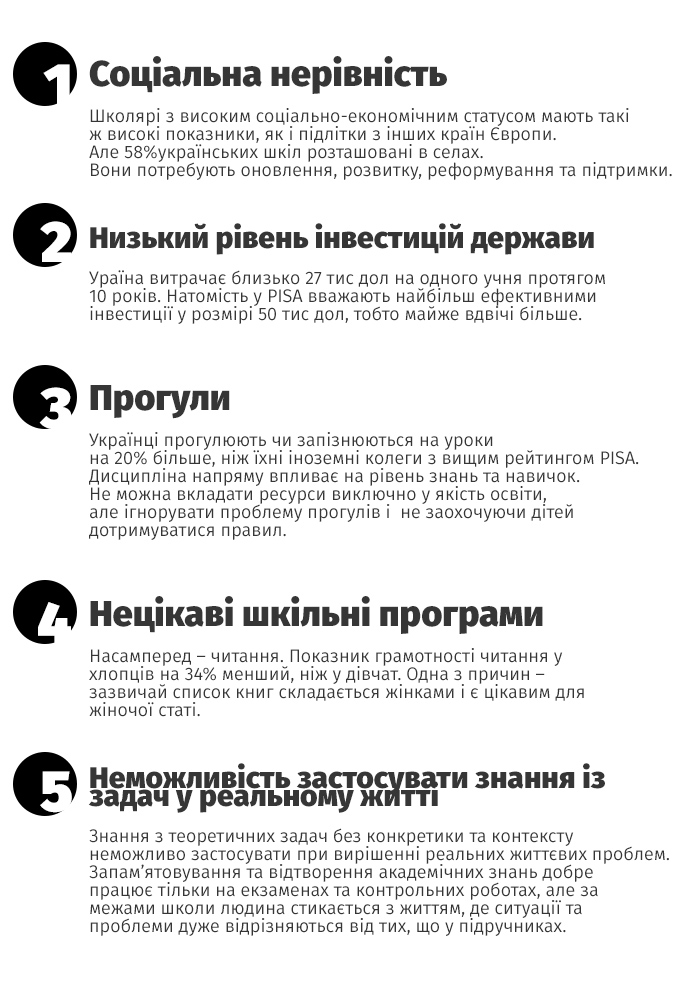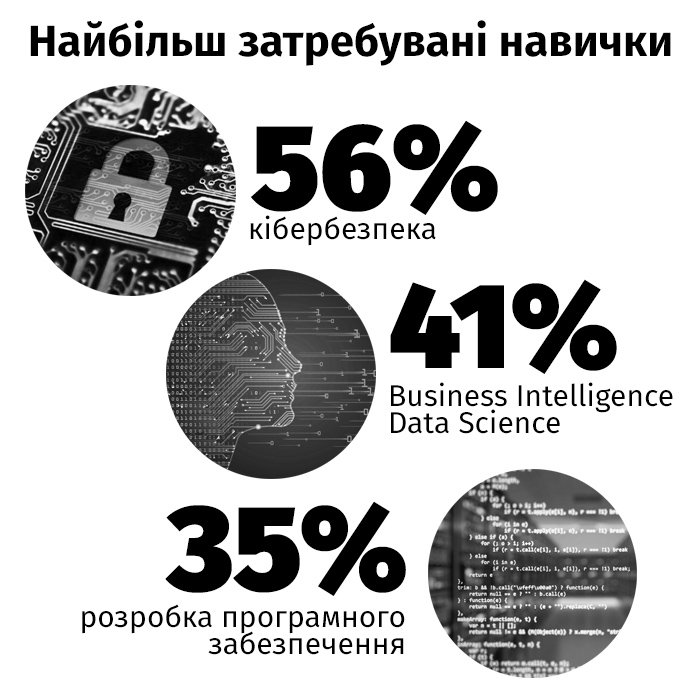
For the first time, Ukraine took part in the international PISA research. The results raised a heated discussion in the media and social networks. One part of people see the results of the test as a failure of the educational system, and another part as a precious chance to develop and work on mistakes.
What conclusions can be drawn from the results of Ukraine? How to change the educational system for future students and how to improve education for those who are already sitting at the desks? We are looking for answers together with representatives of the Ukrainian IT community.
In 2018, the 7th round of the international PISA study was held — assessment of knowledge in mathematics, reading, and science among fifteen-year-old students from around the world.
The program was founded in 1997 and is coordinated by the Organisation for Economic Co-operation and Development (OECD). The idea is to comprehensively assess students' readiness for the tasks that await them in real life. Its aim is not to create another level of dispositions but to help students, schools, and countries to make a real assessment of adolescents' knowledge and to help solve educational problems.
A total of 79 countries were tested, including Ukraine, which participated for the first time. The results of our students were not the worst, but also not the best.
For example, 38% of Ukrainian schoolchildren coped with the task in mathematics, which put the country on a 41-46th place in the ranking. This is higher than Moldova and Georgia but lower than Belarus, Hungary, Poland, and Estonia.
Adviser to the Minister of Education of Ukraine Ivanna Kobernik

"As everyone already knows, the most unpleasant results of the Ukrainian teenagers were in mathematics.
In the Ukrainian PISA report, examples of tasks of previous years, original tasks-2018 are not allowed to be published.
The photo shows a task, with an analog of which only 38% of Ukrainian 15-year-old schoolchildren coped.
Although this is the type of tasks which have to be solved all the time in real life.

You cannot blame teenagers — they have not seen such tasks in their textbooks, such contextual tasks. There are examples and equations similar to the correct solution in the books, but the result of PISA shows that they do not work without context.
In terms of specialist terminology, this is a task for optimization with elements of combinatorial analysis. There are no optimization tasks in the school.
There is a miserable amount of combinatorial tasks (as well as time to study them). Is there any hope for the new state standard of basic education (grades 5-9), which the MES promised to finalize with the results of PISA. But this will only affect those who went to school in 2018."
According to the results of the program, 36% of students have not reached the basic level of knowledge in mathematics, 26% — in reading, 26% — in science.
Yuriy Lazebnikov, Managing Partner of TECHIIA Holding

"Never believe in pallid statistics, figures are nothing more than facts for further reflection and analysis, not judgment or truth in the last instance.
It may seem that the situation is critical, and the Ukrainian education system is in crisis. At the same time, it is inappropriate to compare the indicators of Ukraine with Estonia with its ~1 million people.
With this approach, we can confidently say that the Vatican is the most religious country, and Liechtenstein, with its 40 thousand inhabitants, is the world leader in terms of socio-economic indicators.
In such a scheme, the U.S., Japan, and Canada will be at the end of the list and look like there is a catastrophic situation."
European post-Soviet countries, which took high positions in the rating, have long understood the importance of education. In recent years, they have had the opportunity to monitor the results of PISA and use them to reform education and update educational programs and increase funding systematically. Now it's time for Ukraine.
The Minister of Education Anna Novosad and Zoya Litvin, head of NGO "Osvitoria," noted a number of challenges faced by teachers in Ukraine.

Yuriy Lazebnikov adds: "The study shows that the quality of education in cities is 2.5 times higher than in rural areas. That is, schoolchildren in Ukrainian cities have shown results above the European average.
If we do not take into account the need to reform education around the world, the conclusion within Ukraine is obvious. The problem is not in the approaches to education, as in cities and villages, the program is the same. The problem is the economic lag between less-developed rural areas and large cities, the slow introduction of new technologies, the worse material support, and the inability to pay teachers with dignity.
All this leads to a logical lag in the process of obtaining and providing knowledge to students outside the big cities."
That is, to the list of priority steps in the reform of education, we can add a paragraph on improving the level of teaching in schools in small towns and villages.
At the same time, Ukraine is increasing the number of private schools and courses, where schoolchildren and students can obtain STEM knowledge (Science, Technology, Engineering, Mathematics). All over the world, there is an acute shortage of specialists with this very set of knowledge.
This year, more than 70% of employers using IT has experienced a shortage of specialists in technological specialties, and the most popular skills are: cybersecurity (56%), Business Intelligence and Data Science (41%), and software development (35%). In Germany alone, according to the German information technology association Bitkom, the shortage of IT specialists reached a new record of 82 thousand vacancies in 2018.

Viktoria Dzyba, Chief HR Officer of TECHIIA Holding

"Technical skills only, even at a high level, will not surprise the employer.
Communication skills become as important as technical skills. Therefore, effective interaction with the team, the ability to negotiate, to engage in self-development, and be focused on the overall result should be laid since school age.
Companies are not interested in robots that mechanically perform their work, but in strong and motivated individuals who can take responsibility and drive the processes."
Оriginal article by .


